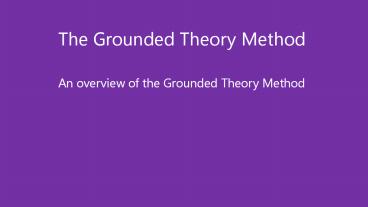An Overview of the Grounded Theory -MIS - PowerPoint PPT Presentation
Title:
An Overview of the Grounded Theory -MIS
Description:
An Overview of the Grounded Theory -MIS Lutaaya Shafiq, Henry Paul Mbaguta, Sharon Nakigudde, Esther Nanyonga, Monica Alwelo – PowerPoint PPT presentation
Number of Views:130
Title: An Overview of the Grounded Theory -MIS
1
The Grounded Theory Method
An overview of the Grounded Theory Method
2
Objectives
- Provide a Background on Grounded Theory
- Review the 4 main types of Grounded Theory
- Applicability of the Grounded Theory
- Strengths associated with the Grounded Theory
- Limitations of the Grounded theory
3
Introduction The Grounded Theory
The Grounded theory is a method of qualitative
research that studies peoples experience with a
process and then generates a theory or
explanation on how the process works.
4
Methods of conducting the grounded theory.
- Determine the research questions and whether the
research questions can give you answers to the
questions - Recruitment
- Data collection
- Data Analysis
5
The cycle of analysis in Ground Theory
6
Applicability of the grounded theory
Can be applicable in teaching students in class.
This is useful in expanding the insight and
knowledge of the students. It also enables the
lecturer/teacher organize feedback to students.
7
Strengths
- Helpful to develop an understanding phenomenon
that cannot be explained with existing theories
and paradigms - This methodology offers a systematic and rigorous
process of data collection and data analysis. - Application of this methodology in practice
fosters creativity and critical thinking
8
Strengths
- Theory matches realities in the field
- Generalizability
- Theoretical abstractions remain constantly
evaluated and verified through research in the
field - Structured approach to analyzing qualitative data
- Can provide useful structural analysis in a mixed
methods approach
9
Limitations of the theory
- The recruitment process of participants is often
difficult depending on the research topic and
scope. - A lot of time is spent trying to gather data.
- Analysis of the collected data often is difficult
- The researcher may be biased depending on the
scope of data or the field of study. - Grounded theory often leads to generalized
results as the sample participants may not
reflect the experiences of the whole world.
10
Limitations of the theory
- Time in the field
- Consistency of data/samples (esp. when time is
short) - Logistical difficulties
- Reproduction and verification nearly impossible
readers have no way of judging the analytical
process - Researcher bias
- Lack of definition a method within a method
11
The Team
12
The End
Thank you!































